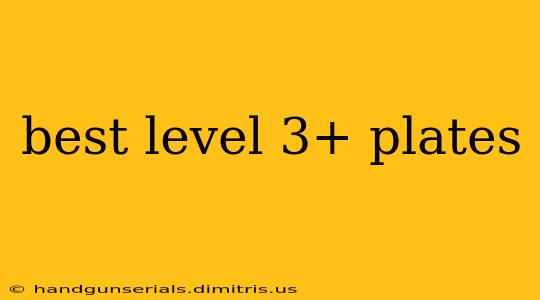Choosing the right body armor is a serious decision, impacting personal safety and potentially life-saving in critical situations. Level III+ plates represent a significant upgrade in protection compared to lower levels, offering robust defense against a wider range of threats. This guide will explore the key factors to consider when selecting Level III+ plates and highlight some of the top contenders on the market. Note: This information is for educational purposes only and should not be considered professional advice. Always consult with a certified armor expert before making a purchase.
Understanding Level III+ Ballistic Protection
Level III+ body armor plates are designed to stop high-velocity rifle rounds, exceeding the protection offered by Level IIIA and Level III plates. Specifically, they are tested and certified to defeat rounds like the 7.62x51mm M80 ball and often offer additional protection against other threats including certain armor-piercing rounds. This heightened protection comes with increased weight and cost.
Key Factors to Consider When Choosing Level III+ Plates
Several crucial factors influence the selection of Level III+ plates:
1. Threat Level:
This is paramount. What specific threats are you preparing for? Knowing the caliber and type of ammunition you need protection against will guide your choice. Simply choosing "Level III+" isn't sufficient; understand the specific threats you're facing.
2. Plate Material:
Several materials are used in Level III+ plates, each with its strengths and weaknesses:
- Ceramic: Often lighter than steel, ceramic plates offer excellent ballistic performance. However, they can be more susceptible to cracking or shattering upon impact.
- Steel: Steel plates are generally heavier but offer exceptional durability and resistance to multiple hits. They are typically less expensive than ceramic options.
- Polyethylene (UHMWPE): This high-strength material is lightweight and offers excellent ballistic protection, often favored by law enforcement and military personnel. It's also known for its flexibility.
3. Plate Size and Weight:
The size and weight of the plates are crucial for comfort and wearability. Larger plates offer more coverage but significantly increase weight and bulk. Consider the intended use and your physical capabilities when selecting plate size. Finding the right balance between protection and comfort is essential.
4. Plate Shape and Curvature:
Plate shape affects how well they fit within the carrier. Some plates are curved to conform to the body, enhancing comfort and mobility. Others are more rigid and flat.
5. Manufacturer Reputation and Certification:
Choosing a reputable manufacturer with a proven track record and NIJ (National Institute of Justice) certification is vital. NIJ certification validates that the plates meet specific performance standards. Always verify the certification number and details on the manufacturer's website.
6. Price:
Level III+ plates represent a significant investment. Balance cost with the level of protection required and your budget. Don't compromise on safety for the sake of saving a few dollars.
Top Considerations (Not a Ranked List)
It's impossible to definitively declare "the best" Level III+ plates without knowing your specific needs and threat assessment. However, several reputable manufacturers consistently produce high-quality plates:
- Highcom: Known for producing high-quality and reliable plates across various protection levels.
- Point Blank: Another reputable manufacturer known for its extensive research and development efforts in body armor technology.
- Safeguard Armor: Often praised for offering a good balance of performance and price.
Disclaimer: This is not an exhaustive list and does not constitute an endorsement. Thorough research is crucial before making a purchase.
Conclusion
Selecting the best Level III+ body armor plates requires careful consideration of numerous factors. Prioritize understanding your specific threat level, researching reputable manufacturers, and verifying NIJ certifications. Remember that proper fitting and training are also crucial for maximizing the effectiveness of your body armor. Consult with a professional armor expert for personalized guidance. Your safety is paramount.

